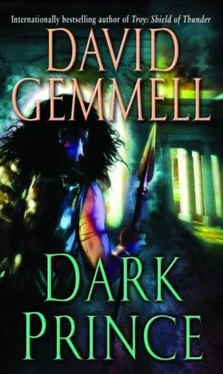It was Hephaistion in whom Alexander confided, and Hephaistion who recognized when the Dark God was close to the ascendant. The King's voice would grow cold, his eyes distant. Then he was chilling. .
As on the night in the captured city of Persepolis when he had led a drunken mob of torch-bearers to destroy one of the great wonders of the world, the beautifully carved wooden temple to Ahura Mazda containing the works of the prophet, Zoroaster. Hephaistion had stood by, stunned, as Alexander hurled oil over the ox-hides on which the words of the prophet were written in gold.
Twenty thousand hides, the most treasured possession of the Persian people, destroyed in one night of debauchery, billowing flames clawing at wooden carvings which had lasted for centuries under a Persian sun.
Alexander remembered nothing of it the following morning.
Then had come the Night of the Spear.
A late-night feast had ended with the cavalry general, Cleitus, asking the King why he had taken to wearing Persian robes and insisting on the Persian practice of forcing his subjects to prostrate themselves before him, kissing the ground at his feet.
Alexander was embarrassed by the question, for there were several Persians present and Hephaistion knew that, though the King did not like the ritual, he was endeavouring to act like a Persian monarch, honouring their customs.
But he had never asked his Macedonian officers — nor any Greek — to prostrate themselves before him.
Cleitus was drunk, and unhappy at being asked to sit away from the King's right hand, his place being taken by a Persian general.
Hephaistion had tried to pull Cleitus away from the table, urging him to return to his tent and sleep off his drunkenness, but the old cavalryman pushed him away and stumbled towards the King, shouting: 'I served your father, your arrogant puppy, and I never had to kiss his feet. Damned if I'll kiss yours!'
Hephaistion saw Alexander stiffen and watched in sick horror as his eyes grew pale. Never before had the transformation happened publicly and he ran towards the King, desperate to get him away from the revellers. But he was too late. Alexander stepped back, seized a spear from a guard and thrust the iron blade through Cleitus' belly.
Blood gushed instantly from the old man's mouth and he fell back, the spear tearing loose from the wound. For several moments the stricken man writhed on the floor, screaming. Then, with a gurgling, choking cry he died.
A stunned silence followed.
Alexander blinked and staggered as Hephaistion reached his side, taking his arm. 'What have I done?' whispered Alexander. 'Sweet Zeus!' Turning the spear upon himself he tried to fall upon the blade, but Hephaistion wrestled it from him. Two guards came to his aid and the weeping King was helped from the tent.
The following day, his hair covered with ash, Alexander led the funeral procession behind Cleitus' body. Instead of following the Macedonian custom of burning the corpse and placing the bones in a ceremonial casket of gold, he had ordered Egyptian embalmers to preserve the body, intending to have it placed in a crystal case and displayed in a specially built tomb of marble.
The King's grief was obvious to all and the soldiers, who loved Alexander, forgave him swiftly. But his officers, having seen him murder a loyal brother, were silent, and Hephaistion knew their thoughts. Who will be next?
The embalming of Cleitus was a memory Hephaistion would never forget.
A slender Egyptian moved to the body carrying a box of cedar wood from which he produced a long, narrow spike, bent and forked at the tip.
'What is he doing?' Hephaistion asked the King.
Alexander's reply was detached, his voice distant and cool. 'He must remove the internal matter of the skull to prevent it rotting. So that the face is unmarked, he will insert the spike in the nostril and hook it into the brain, dragging it out.'
'I need to know no more,' snapped Hephaistion, turning and rushing from the room.
Later he made Alexander promise that if he, Hephaistion, ever fell in battle, he was to be buried in the Macedonian way.
The gulls moved away from the broken body on the rocks below and Hephaistion stepped back from the parapet and walked from the cliff-top castle down the long winding path to the small bay. The trireme's captain — a short, stocky Rhodian called Callis — met him on the beach.
'Will she be long?' he asked. 'The tide is turning and we need to sail within the hour.'
'She will not be travelling with us, captain. Sadly, the Lady Aida is dead.'
'What a wasted journey,' said Callis, cursing. 'Ah well, it will be a relief to the men. No sailor likes a woman aboard.
And they say she was a witch who could foresee the future.'
'I do not think that was true,' said Hephaistion.
By dusk the trireme was sailing east on the busy trade lane to Cyprus, a stiff breeze billowing the great sail, the oars drawn in, the oarsmen resting at their seats on the three rowing decks. Hephaistion sat on a canvas-topped chair at the stern, eyes locked to the land sliding slowly by them.
First Caria, then Lycia, once so hostile but now merely small outposts of the Empire of Alexander.
He remembered the ceaseless forced marches under Parmenion four years ago as the Macedonian advance troops sought to avoid major clashes with the Persian forces. How right the Spartan had been. Had he fought the Persians and won, then Darius would undoubtedly have gathered an even larger force and Alexander would have arrived in Asia to find himself confronted by an irresistible enemy. The lands of the Persian Empire were more vast than Hephaistion could ever have imagined, its people more numerous than the sand grains of the beaches he could see to the north.
Even now, after almost six years of war and Alexander's winning of the crown, there were still battles to fight -
against the Sogdianians of the north, the Indians of the east and the Scythian tribesmen of the Caspian Sea.
Parmenion had marched a second Macedonian army to the east, winning two battles against superior numbers.
Hephaistion smiled. Even close to seventy years of age, the Spartan was still a mighty general. He had outlived two of his sons: Hector had died at the Battle of the Issus three years ago, while Nicci had been slain at Arbela fighting alongside his King.
Only Philotas remained.
'What are you thinking?' asked Callis, his huge arms resting on the tiller.
Hephaistion glanced up. 'I was watching the land. It seems so peaceful from here.'
'Yes,' agreed the sailor. 'All the world looks better from the sea. I think Poseidon's realm makes us humble. It is so vast and powerful and our ambitions are so petty alongside it. It highlights our limits.'
'You think we have limits? Alexander would not agree.'
Callis chuckled. 'Can Alexander sculpt a rose or shape a cloud? Can he tame an angry sea? No. We live for a little while, scurrying here and there, then we are gone. But the sea remains: strong, beautiful, eternal.'
'Are all seamen philosophers?' Hephaistion asked.
The captain laughed aloud. 'We are when the sea surrounds us. On land we rut like mangy dogs, and we drink until we piss red wine. What war will you be fighting when you get back?'
Hephaistion shrugged. 'Wherever the King sends me.'
'What will he do when he runs out of enemies?'
'Does a man ever run out of enemies?'
The moment had come, as he had long known it would, and Philotas felt a sudden coldness in his heart. His father had been right all along. His mouth was dry, but he did not touch the wine set before him. Today he wanted his head clear.
Alexander was still speaking, his officers gathered around him in the throne-hall at the palace of Susa. One hundred men, warriors, strong and courageous, yet they kept their gaze to the marble floor, not wishing to look up into the painted eyes of the King.
Читать дальше












